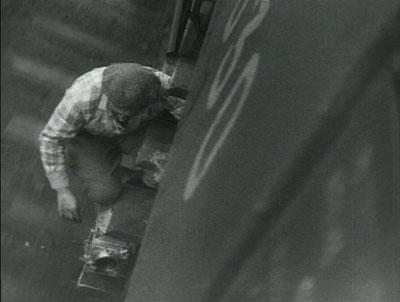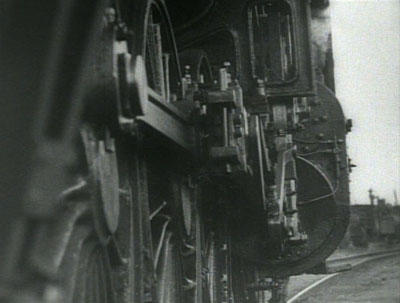Wednesday, September 21, 2005:

The Alloy Orchestra -- Man with the Movie Camera excerpt (Chapter 4)
On one level The Man with the Movie Camera is an exploration of a day in the life of Soviet society, various workers preparing for and getting to work; on another level, the film is a celebration of film itself, grabbing you by the lapels and raving about the possibilities; it fires off impassioned tangents about the camera's all-seeing eye, about film's versatility and usefulness, about the joy of montage. So out go Dziga Vertov and Michael Kaufman to prove it, catching life unawares--sometimes filming it covertly, sneaking up on it, sometimes getting in its face to see what kind of reaction comes about--at pubs, at park benches, in the street, in the maternity ward, people going to work, people going to the theater, people at work making films to show in the theater. The film fits in well with Vertov's propaganda work of the time, though he scorned fiction as bourgeois luxury (I wonder what happened about that, if anything--Sergei Eisenstein and Battleship Potemkin were both enormously liked at the time). Fortunately the film is exhilarating work.
The film has aged so well at least in part because Vertov was doing things with it that still seem fresh and inspired seventy-six years later: freeze frames, reverse motion, split screen, insane angles, commentary and meta-commentary and commentary about the meta-commentary all mixed up in a heady brew. And the music--the music bumps along, exploding primary colors and syncopated whimsy, jaunty angular pounding piano like some occult precursor to Monk and Brubeck, cymbals, chimes, snares rattling like a train, like a circus on wheels, like a rollercoaster between towns.
 This track is from the 1996 re-release of the film, which had a new soundtrack recorded from Vertov's notes. I've heard an earlier version (the first, I think), which pales in comparison--I mean it pales in the way a ten-minute sketch pales in comparison to Güernica, or a wine cooler in comparison to a shot of whiskey. By which I mean, there's no comparison.
This track is from the 1996 re-release of the film, which had a new soundtrack recorded from Vertov's notes. I've heard an earlier version (the first, I think), which pales in comparison--I mean it pales in the way a ten-minute sketch pales in comparison to Güernica, or a wine cooler in comparison to a shot of whiskey. By which I mean, there's no comparison.
I've heard there's yet another version of the soundtrack but I haven't yet gotten past this one. Eventually I'll seek it out, but for now this one has my full respect and it's hard to imagine being any more satisfied.
The track does just end suddenly, yes--we're riding along in a car, watching the next car; we're in a car further back, watching the cameraman filming the other car; we're alongside a horse pulling a carriage--the horse stops. Freeze frame. It reverses a bit, slides out of frame. We're in the editing booth with the editor, looking through clips, pulling them out: appraising, selecting, cutting, splicing.
The film was silent but for the 1996 re-release some sound effects have been foleyed in, like the crowd noise at the start of this track and the arrival of the train.
As far as I know, the Alloy Orchestra's version of the soundtrack is not available on CD. I would love to be proven wrong.
The Alloy Orchestra: The Man with the Movie Camera

The Alloy Orchestra -- Man with the Movie Camera excerpt (Chapter 4)
On one level The Man with the Movie Camera is an exploration of a day in the life of Soviet society, various workers preparing for and getting to work; on another level, the film is a celebration of film itself, grabbing you by the lapels and raving about the possibilities; it fires off impassioned tangents about the camera's all-seeing eye, about film's versatility and usefulness, about the joy of montage. So out go Dziga Vertov and Michael Kaufman to prove it, catching life unawares--sometimes filming it covertly, sneaking up on it, sometimes getting in its face to see what kind of reaction comes about--at pubs, at park benches, in the street, in the maternity ward, people going to work, people going to the theater, people at work making films to show in the theater. The film fits in well with Vertov's propaganda work of the time, though he scorned fiction as bourgeois luxury (I wonder what happened about that, if anything--Sergei Eisenstein and Battleship Potemkin were both enormously liked at the time). Fortunately the film is exhilarating work.
The film has aged so well at least in part because Vertov was doing things with it that still seem fresh and inspired seventy-six years later: freeze frames, reverse motion, split screen, insane angles, commentary and meta-commentary and commentary about the meta-commentary all mixed up in a heady brew. And the music--the music bumps along, exploding primary colors and syncopated whimsy, jaunty angular pounding piano like some occult precursor to Monk and Brubeck, cymbals, chimes, snares rattling like a train, like a circus on wheels, like a rollercoaster between towns.
 This track is from the 1996 re-release of the film, which had a new soundtrack recorded from Vertov's notes. I've heard an earlier version (the first, I think), which pales in comparison--I mean it pales in the way a ten-minute sketch pales in comparison to Güernica, or a wine cooler in comparison to a shot of whiskey. By which I mean, there's no comparison.
This track is from the 1996 re-release of the film, which had a new soundtrack recorded from Vertov's notes. I've heard an earlier version (the first, I think), which pales in comparison--I mean it pales in the way a ten-minute sketch pales in comparison to Güernica, or a wine cooler in comparison to a shot of whiskey. By which I mean, there's no comparison.I've heard there's yet another version of the soundtrack but I haven't yet gotten past this one. Eventually I'll seek it out, but for now this one has my full respect and it's hard to imagine being any more satisfied.
The track does just end suddenly, yes--we're riding along in a car, watching the next car; we're in a car further back, watching the cameraman filming the other car; we're alongside a horse pulling a carriage--the horse stops. Freeze frame. It reverses a bit, slides out of frame. We're in the editing booth with the editor, looking through clips, pulling them out: appraising, selecting, cutting, splicing.
The film was silent but for the 1996 re-release some sound effects have been foleyed in, like the crowd noise at the start of this track and the arrival of the train.
As far as I know, the Alloy Orchestra's version of the soundtrack is not available on CD. I would love to be proven wrong.
Labels: jazz, movies, soundtrack